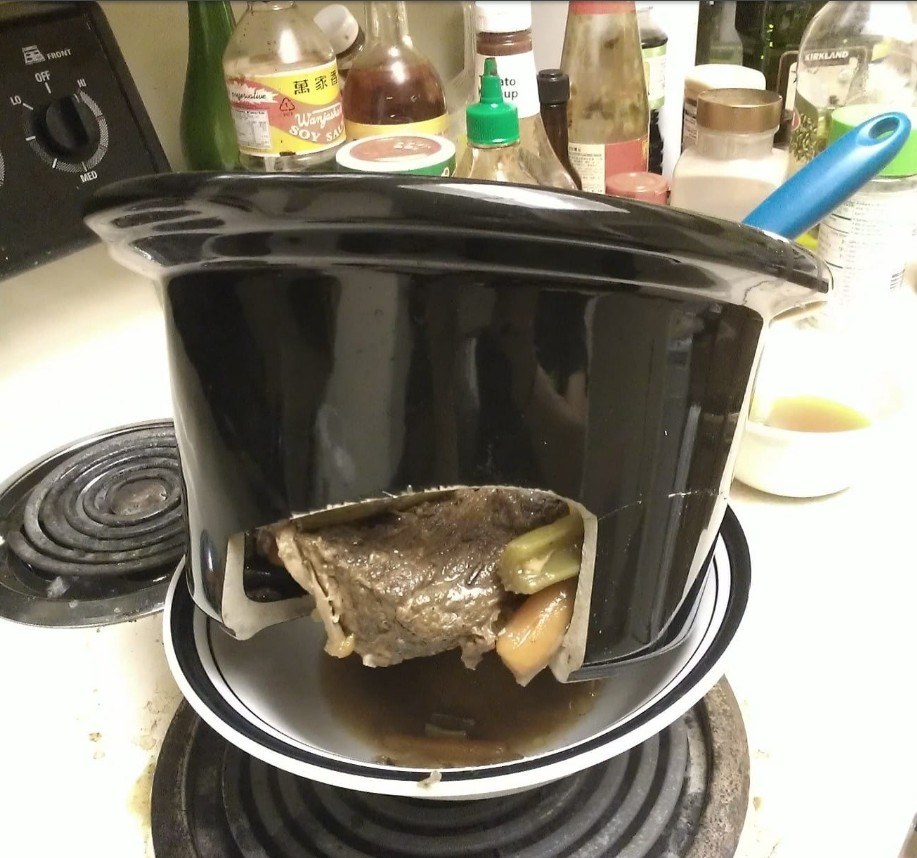
11 Foods You Should Never Put in a Slow Cooker – Avoid These Common Mistakes!
✅ Better Option:
Cook pasta or rice separately and add to bowls before serving.
🍝 Pro Tip: Use hearty noodles like egg noodles only if cooking less than 2 hours.
❌ 3. Boneless Chicken Breast
Why: Lean chicken breast dries out easily. After 4+ hours on low, it becomes dry, stringy, and tough.
✅ Better Option:
Use chicken thighs — they’re fattier, more forgiving, and stay juicy.
Or cook breasts for only 2–3 hours on low — then check early.
❌ 4. Delicate Vegetables (Zucchini, Spinach, Peas, Tomatoes)
Why: These veggies break down fast. After hours of simmering, they turn soggy, slimy, or disappear.
✅ Better Option:
Add delicate veggies in the last 30–60 minutes.
🥦 Bonus: They’ll retain color, texture, and nutrients.
❌ 5. Fried Coatings (Breaded Chicken, Onion Rings)
Why: Any crispy coating will turn soggy in the moist slow cooker environment — no crunch left.
✅ Better Option:
Brown breaded items after cooking, or use them as toppings.
🍗 Try: Baking or air-frying breaded chicken to serve over slow-cooked sauce.
❌ 6. Raw Meatballs (Uncooked & Unbrowned)
Why: Raw meatballs can clump together, release too much fat, and become dense or unevenly cooked.
Plus, no fond = less flavor.
✅ Better Option:
Brown meatballs first in a skillet before adding to the sauce.
🍝 Result: Richer taste, better texture, no greasy pool.
❌ 7. Seafood (Fish, Shrimp, Scallops)
Why: Seafood cooks quickly. In a slow cooker, it turns overcooked, rubbery, or falls apart.
❌ Not ideal for all-day cooking.
✅ Better Option:
Add seafood in the last 15–30 minutes — just until opaque and tender.
🍤 Example: Add shrimp to chowder at the end.
❌ 8. Leafy Greens (Kale, Chard, Lettuce)
Why: Greens like kale can hold up okay, but most wilt into a sad, dark pile.
Lettuce? It melts.
✅ Better Option:
Stir in leafy greens during the last 15–20 minutes.
🌿 Bonus: Brightens flavor and adds freshness.
❌ 9. Canned Soup (As a Base)
Why: Many canned soups already contain thickeners, starches, and seasonings.
In a slow cooker, they can become too thick, gloopy, or overly salty.
✅ Better Option:
Use broth or stock as your base — then season fresh.
🍅 If using canned soup (e.g., cream of mushroom), thin it with water and add late.
❌ 10. Alcohol (Wine, Beer, Liquor)
Why: Alcohol doesn’t fully evaporate in a slow cooker (due to lower temps).
It can leave a harsh, bitter taste and overpower the dish.
✅ Better Option:
Deglaze with alcohol on the stove first, let it reduce, then transfer to slow cooker.
🍷 Or: Add small amounts near the end — 30 mins before serving.
❌ 11. Frozen Meats or Veggies
Why: Frozen food lowers the internal temperature of the slow cooker, keeping it in the “danger zone” (40°F–140°F) too long — increasing risk of bacterial growth.
✅ Better Option:
Always thaw meat and frozen veggies before adding.
❄️ Safety first!
✅ Smart Slow Cooker Swaps Summary
Milk/Cream
Add dairy at the end
Pasta/Rice
Cook separately
Chicken Breast
Thighs or short cook time
Zucchini/Peas
Add last 30 mins
Breaded Foods
Brown after cooking
Raw Meatballs
Pre-brown first
Shrimp/Fish
Add at the end
Lettuce
Fresh garnish
Canned Soup
Broth + fresh seasoning
Wine/Beer
Reduce on stove first
Frozen Ingredients
Always thaw first
❤️ Final Thought: Slow Cooking Is Magic — But It Has Rules
You don’t need to give up your slow cooker to make great meals.
Just know what works — and what doesn’t.
Because true kitchen wisdom isn’t about following recipes blindly…
It’s about understanding why things happen — so you can cook with confidence, flavor, and joy.
So next time you reach for that pot…
Think twice.
Then make something amazing. 💛
